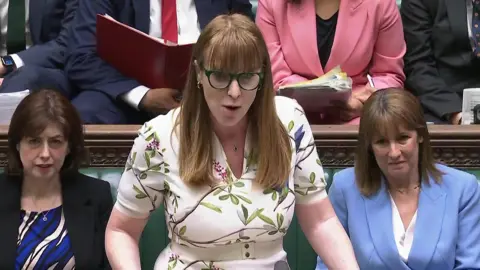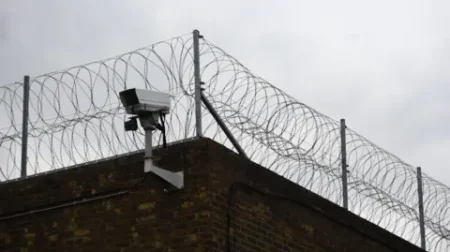In a significant announcement, Deputy Prime Minister Angela Rayner has confirmed that a vote on the government’s welfare bill will proceed as scheduled on Tuesday, defying the considerable opposition from within her party. A remarkable 130 Members of Parliament (MPs) have openly signed an amendment calling for the proposed welfare changes to be scrapped. Among these, a staggering 120 are Labour backbenchers who express their discontent with the measures, hinting at a potential embarrassing defeat for the government.
In light of this growing dissent, senior ministers, including Chancellor of the Exchequer and the Health Secretary, have been actively reaching out to MPs in an attempt to garner support and dissuade them from opposing the bill. During a question session in the House of Commons, shadow chancellor Sir Mel Stride posed a challenging question to Rayner, seeking an explanation as to why she believed so many of her party colleagues were mistaken in their opposition.
In a robust defense, Rayner asserted that the bill is designed to assist individuals in entering the workforce and aims to eliminate the need for reassessments for individuals deemed severely disabled. She articulated the Labour Party’s commitment to not abandon “millions of people trapped in a failing system left behind by the Conservatives.” This strategic positioning not only defends the bill itself but also attempts to counter the criticism directed at her party.
Following the Prime Minister’s Questions, a spokesperson from Downing Street echoed Rayner’s assertion, indicating that leader Sir Keir Starmer acknowledges the strong sentiments against the welfare bill. Starmer firmly stated that allowing millions to remain in a dysfunctional system is neither moral nor progressive. This statement signals the depth of the internal struggle and contrasts the government’s ambition against the concerns raised by its own members.
The welfare bill primarily seeks to amend the qualifications for Universal Credit and Personal Independence Payments, impacting those claiming various disability and sickness benefits. The government has justified these changes by asserting their necessity in curbing the rising number of benefit claimants, presenting a narrative that emphasizes fiscal responsibility. However, there remains a persistent undercurrent of criticism from Labour members, who argue that insufficient assessments have been made regarding the potentially adverse effects of such measures, especially concerning poverty escalation.
Within the dissenting ranks, Conservative leader Kemi Badenoch has indicated a willingness to support the bill, provided the government can assure that it achieves reductions in the welfare budget and successfully aids more individuals in securing employment without increasing taxes. However, this expectation may be unrealistic, given the government’s current stance and hesitance to cede to these terms.
The discourse at Prime Minister’s Questions took on an intense tone, particularly as it took place in the absence of Prime Minister Rishi Sunak, who was attending a NATO summit in the Netherlands. During this exchange, speculation arose regarding whether the government would retract the vote to avert a potential defeat, emphasizing the dire situation they are navigating. Nevertheless, Rayner responded confidently, declaring: “We will go ahead on Tuesday,” countering the rumors of a postponement.
Further complicating matters, Stride recalled a past governmental retreat concerning the winter fuel payment, suggesting that Labour backbenchers had been misled previously. Stride extended an open invitation to the government to reconsider their bill with the caveat that it includes a commitment to reduce overall welfare expenditures.
Rayner, in her counterpoint, criticized Stride’s track record, pointing out that he previously oversaw a period where a significant number of young people were excluded from the economy. This attack highlights the back-and-forth nature of political rhetoric, with each side leveraging the other’s shortcomings to bolster their arguments.
As the discussions continued, both sides reiterated their stances on tax increases and fiscal accountability, creating a persistent debate over the adequacy of welfare reforms. Critics from within Labour maintain that the government is mismanaging welfare, pointing to how current proposals fail to address the underlying issues causing claimant numbers to rise.
As the political pressure mounts, Rayner’s firm intention to persist with the welfare vote illustrates her resolve amidst an environment fraught with dissent and uncertainty. It remains to be seen whether this insistence will hold as senior ministers navigate the turbulent waters of party opposition and public scrutiny. The implications of the vote, should it occur as planned, could not only reshape welfare policy but also test the resolve of the Labour Party as it maneuvers through significant internal challenges. The unfolding situation promises further revelations in the days leading up to the vote and beyond, as all eyes remain fixated on the outcomes of these critical parliamentary developments.











